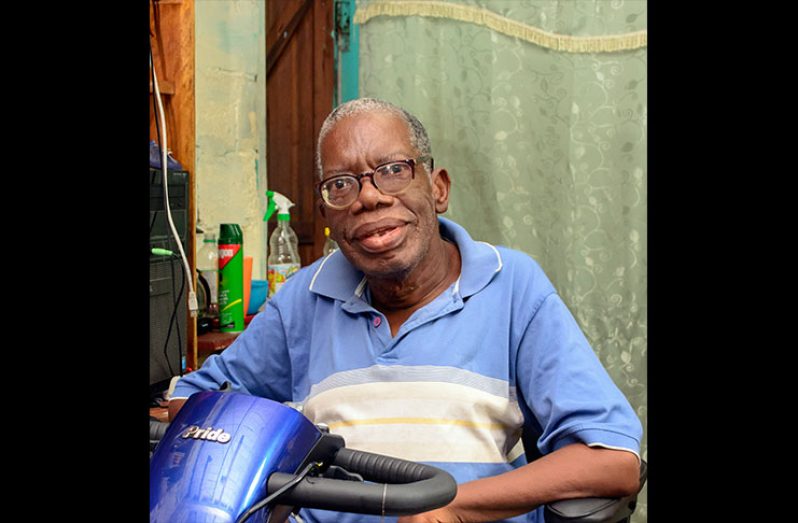– Leon Walcott

LEON ‘Wally’ Walcott, 67, can never forget the day he called up a family friend to go drink a beer. “But when you have to go to the urinal, who will take you?” responded the friend.
This simple incident deeply affected Mr. Walcott, as apart from never expecting this from his friend, it reminded him of his health condition that he had no control over. He thereafter kept to himself and left the house only when it was absolutely necessary.
Doctors kept telling him that he had polio, but it was only after many years that he came to understand his true condition, thanks to Dr. Walter Ramsahoye who was the first doctor to diagnose him with Peroneal Muscular Atrophy (Charcot Marie Tooth’s Disease).
“That’s why I don’t trust doctors; not because they are not competent, but they don’t do enough research. They keep telling me I have polio; polio damages your muscles and it stops, but what I have is progressive,” Mr. Walcott expressed in an interview with the Chronicle a few days ago at his home on Norton Street, Georgetown.
The condition he has, which really started to kick in some 17 years ago, has to do with the withering away of the muscles of the lower limbs. At the moment, Mr. Walcott cannot walk nor can he use his hands fully. The left hand is completely lifeless, although he can use it to balance his body. The right hand, though, still has some life in it,” he said.

Explaining how the disease comes about, he said: “Your mother and father would have a gene that produces a rogue protein. This protein burns off the sheet that covers the nerves, so when it’s exposed, it simply gets rotten. When your nerves go, your muscles go also. That is what is happening.”
Mr. Walcott said the condition doesn’t affect the lifespan, but it makes it difficult to live.
“Before it kicked in, I had a pretty normal life; very active. I used to walk, I used to run, I used to play table tennis, I used to play cricket. But what used to happen was that after rigorous exercises, if I stopped for about a month, I couldn’t resume.”
Growing up at Little Diamond Housing Scheme, on the East Bank Demerara, he had a normal childhood although he had the disability. The father of three attended East Ruimveldt Secondary School, known as “Back School,” where he would later begin a teaching career.
“It’s only around when I turned 50 that my condition really kicked in,” Mr. Walcott, now Head of the Guyana Council of Organisations for Persons with Disabilities, and Director of Support Groups for Deaf Persons recalled.
After leaving teaching in 1981, he worked as a journalist with the Guyana News Agency on Hadfield Street, then as the press officer at the Office of the President. He worked under Presidents Forbes Burnham and Desmond Hoyte during his six-year stint there.

“God has been good to me. And that is why I would tell people I am not a normal disabled person because as I like to boast, I walked the corridors of power.”
No mental Disability
One of the difficulties of having a disability, Mr. Walcott observed, is often having to prove yourself.
“When people look at you, they see your disability; that’s all there is to see. But many of them assume that because you are physically challenged, it goes without saying that you have also have a mental disability. And so I have had to prove myself many times. Not because a person has a physical disability means he has a mental disability,” he stressed.
Mr. Walcott has obtained for himself a Degree from the University of Guyana, majoring in Geography, which he says is a subject that many people shy away from.
When he was gifted with his power chair from the Ministry of the Presidency, and a mobility scooter from a group of friends, this renewed his self-confidence and made his life happier.
He can now go for a beer on his own whenever he likes!




.jpg)










